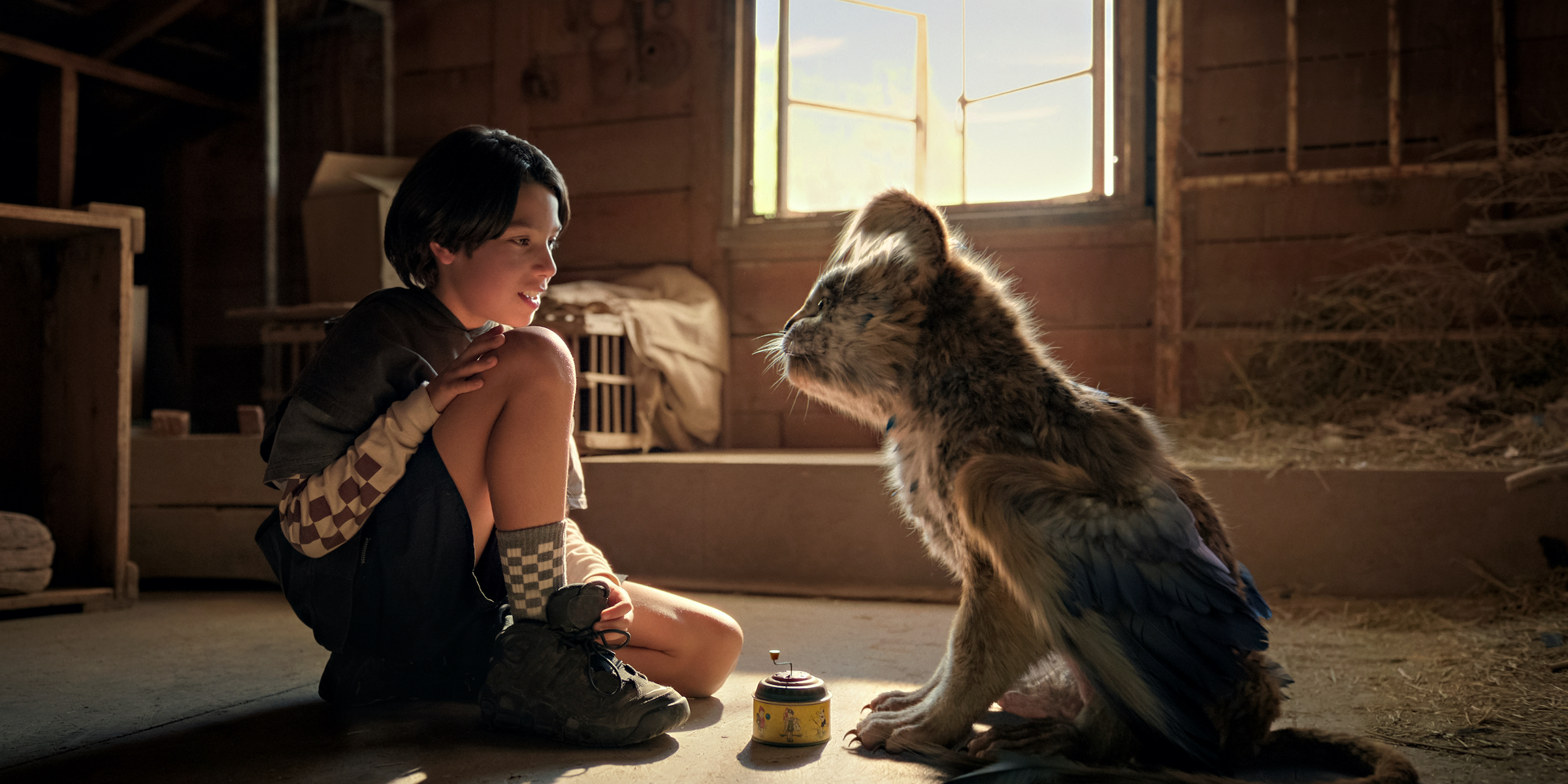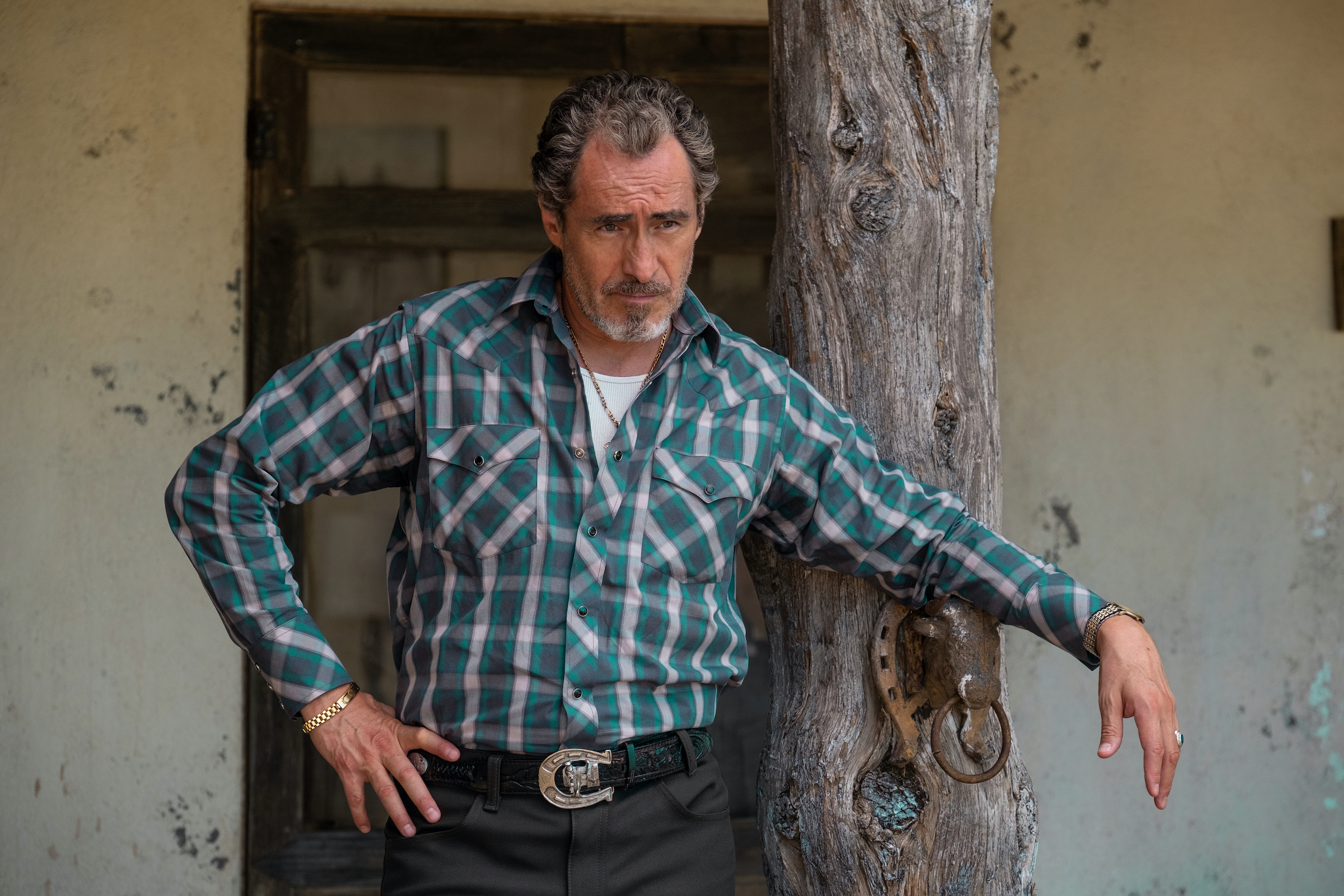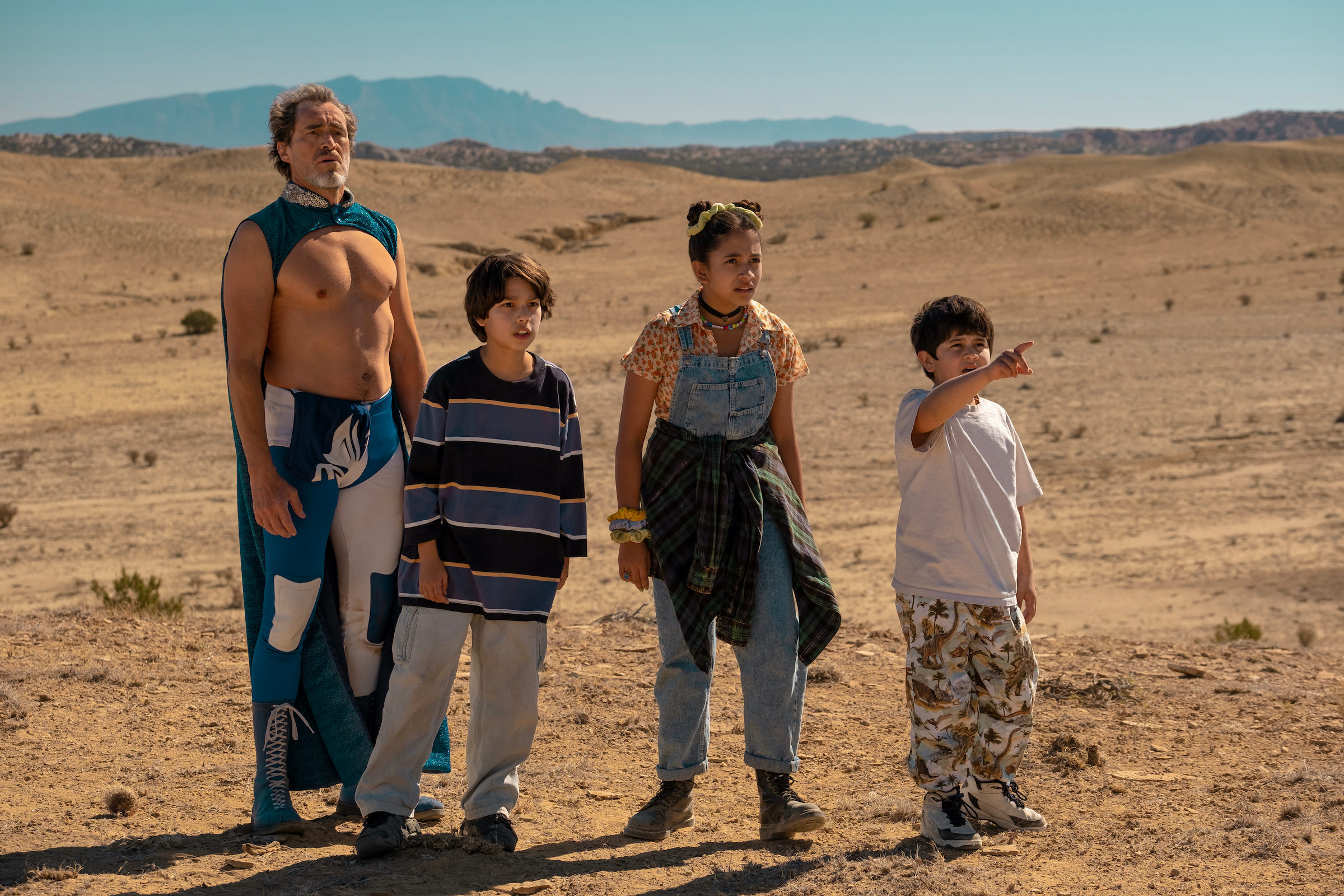In the pastoral back yard of a ranch house in rural Mexico, a grandfather is about to fight his grandson.
Standing in one corner of a makeshift wrestling ring is Relámpago Azul (Blue Lightning), otherwise known as Chava (Demián Bichir), a tough but tender former luchador (wrestler). In the other corner is 13-year-old Alex (Evan Whitten), Chava’s American grandson, who is reluctantly spending spring break with his grandfather and cousins on the ranch.
Alex is wearing the mask of Perico Verde (Green Parakeet), his late father’s former lucha libre (Mexican wrestling) persona. His dad—Chava’s son—recently died of cancer, and Chava can tell that his grandson has yet to fully process the loss. The year is 1996, and Alex has been retreating behind his trusty Game Boy.
“You’re sad, son,” Chava says, trapping Alex in a headlock. “That’s normal. You’re hurt.” “I’m not hurt,” Alex responds. “I just really want to be left alone.” “No,” Chava says. “That’s OK. Let it out, alright? Channel those emotions. Take it all out on me.”
Chava spins around and throws Alex down. “Every time your dad gets brought up, you retreat and hide in that stupid game of yours,” he says, pinning his grandson to the ground. “Face your pain, face your fears and your sorrow. You have to feel the pain of the sadness.”
More from TIME
This pivotal moment arrives two-thirds of the way through Chupa, a fantasy adventure film directed by Jonás Cuarón (son of Mexican filmmaker Alfonso Cuarón), coming to Netflix on Friday. A grieving Alex, visiting his family in Mexico, is slowly discovering who he is, with the help of his grandfather’s tough love, as he approaches adulthood, Bichir tells TIME.
“It seems like he’s pushing him to do something he doesn’t want to do, but he’s only pushing him to face his own fears, and to face his own sadness, and to take it out,” Bichir says. “We tend to keep many of our feelings to ourselves, unless someone helps you to take it out.”
On his coming-of-age journey, Alex finds Chupa, a chupacabra cub, on his grandfather’s ranch. (A chupacabra is a mythical creature of Latin American folklore that is said to drink the blood of goats. Chupa himself is more cuddly than terrifying, although his fully-grown family feels more classically scary.) The titular monster cub has been separated from his parent, and becomes a poignant foil for Alex’s own loss—and his gradual realization that, as his mother tells him, “You’ve got your family, and your family’s got your back.”

Chupa wields lucha libre—a beloved Mexican institution full of rivalries, stories, and throughlines—to build out the narrative that connects Alex and Chava’s family. For a spectacle based on physical fighting, wrestling adds a surprising subtext of vulnerability.
“It’s all based on strength and things that you would actually consider as machismo,” Cuarón says. “But it’s a sport that plays it with a very interesting tongue in cheek—from the costumes to a certain levity and comedy.”
From the second Alex crosses the threshold into his grandfather’s San Javier home, lucha libre is woven into the fabric of the film. On the wall are framed photos of Relámpago Azul in his glory days. Alex’s younger cousin, Memo (Nickolas Verdugo), is obsessed with wrestling, and wears his own luchador costume everywhere. In the hallway stands a mannequin bedecked in Azul’s old mask, cape, and tights.
Bichir—a Mexican icon with whom Cuarón aspired to work—brought his own personal knowledge and passion for the sport to building Chava’s character. Growing up, his father directed plays with a theater company in Querétaro, and the actor recalls going with other families’ kids to the luchas there. He saw legends like El Rayo de Jalisco, Aníbal, Tinieblas el Gigante, and El Perro Aguayo, and the electric atmosphere stayed with him forever.

“I noticed that they would change their voice, they would change their attitude, they would change their way of carrying themselves,” Bichir says. “I wanted that to be a more clear aspect in this character: that he actually becomes somebody else when he’s in his disguise as a superhero.”
Because that’s what luchadores are, he says: Mexican folk superheroes. In the same way that Peter Parker and Spider-Man are two different people, so too are Chava and Relámpago Azul. When Chava is suited up, he feels like King Kong, Mohammed Lee, or Mick Jagger—larger than life. Chava accesses different parts of himself through Azul, just as Bichir does through his characters.
“That’s when I have been able to do crazy things that I wouldn’t do as Demián,” Bichir says. “That’s probably the most beautiful part of being an actor; that anything is possible, and you’re capable of doing and saying anything at all. You become free, totally free.”
Read More: Here’s Everything New on Netflix in April 2023
The luchador costumes in Chupa—Relámpago Azul’s blue sequins, Perico Verde’s green mask, Memo’s metallic cape—were designed by Mariana Guerrero Dingler, who worked with legendary mascarero (mask maker) Arturo Bucio to craft the looks. Obsessed with lucha libre since childhood, she has amassed a sizable collection of vintage magazines and books on the topic—many of which provided inspiration when she set out to capture the greatness and nostalgia of Mexican wrestling in the ‘90s.
“It’s embedded in me,” Guerrero Dingler writes in an email. “I grew up thinking of luchadores as Mexican superheroes. Now as an adult there is something about the uniqueness, the history, and the mystique of this world that just speaks to me and inspires me.”
While watching Bichir work, Cuarón says, he saw three people: the actor, the grandfather, and the luchador. The depth of his masculinity was extra important because, as the director notes, Chava represents the last link to Alex’s family mythology.
“Having grown up in a Mexican family, truly what family does—besides what the movie says, being there for you—it also builds a narrative that helps you identify your place in the world,” Cuarón says. “To me, that narrative particularly came from my grandparents.”
More Must-Reads from TIME
- Cybersecurity Experts Are Sounding the Alarm on DOGE
- Meet the 2025 Women of the Year
- The Harsh Truth About Disability Inclusion
- Why Do More Young Adults Have Cancer?
- Colman Domingo Leads With Radical Love
- How to Get Better at Doing Things Alone
- Michelle Zauner Stares Down the Darkness
Contact us at letters@time.com
